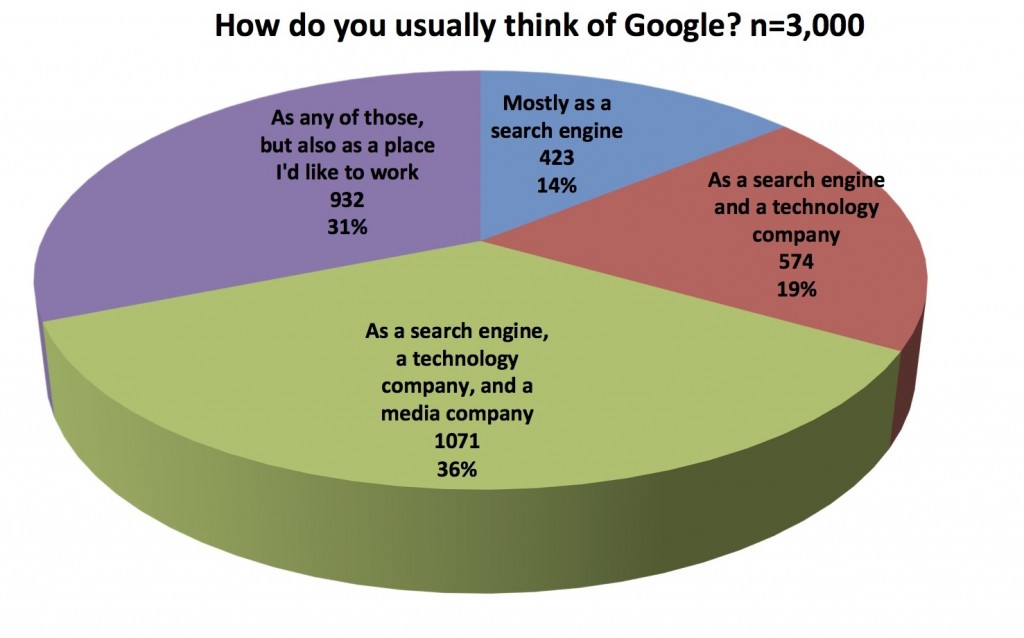Back in April I posted some charts and data from an optional survey presented to students who enroll in my Coursera MOOC, “Understanding Media by Understanding Google.” At that early juncture–I had yet to videotape a single lecture–about 13,000 people had signed up; shortly thereafter, enrollment was paused until we set a firm start date.
Now we’re just 10 days or so away from the Sept. 16 launch, a fine time to update both the registration total (40,000) and the high-level research (3,000 respondents, up from 1,001 all those months ago). Has anything changed as the enrollment has grown, and as the number of people with Coursera accounts has touched 4 million?
Not surprisingly, we can answer both “yes” and “no.” In the “no” category, many of the numbers are so similar I won’t even bother to recreate the graphics. (The pie chart above is one that I didn’t include last time.) To wit:
- About the same percentage of respondents has never taken a MOOC before (57% of the first thousand, 56% of the entire sample).
- About the same percentage of people classify themselves as “geeks” or “Internet experts”–47% then, 48% now. (A self-reported geek says that “my friends turn to me first for help with problems,” while a self-reported expert says “I always know what I’m doing” online.)
- When asked “Where do you learn about the world?”, the rank of six possible media choices didn’t change: The Web (2,821 out of 3,000), books (1,737), TV (1,638), newspapers (1,577), magazines (1,278), and radio (999). (They’re readers!)
The differences come in the reasons that were cited for taking this course. I asked students to rate the importance of several criteria on a scale from “very important” to “not important.” The raw numbers are interesting enough, but more tellingly, some of the proportions shifted meaningfully over the course of the survey.
What follows are the percentages of the first 1,001 students; of the next 1,999 students; and then of all 3,000 who ranked each item as either “very important” or “quite important.”
Relative importance, April vs. August
| How important was the following factor when you chose to enroll? | "Very" or "quite" important: First 1,001 | "Very" or "quite" important: Next 1,999 | "Very" or "quite" important: All 3,000 |
|---|---|---|---|
| The subject is relevant to my academic field | 33.6% | 36.0% | 35.2% |
| I'm curious about online courses | 31.1% | 45.1% | 40.4% |
| I want to earn a credential for my CV / résumé | 33.7% | 48.4% | 43.5% |
| It's offered by a prestigious university | 35.3% | 45.4% | 42.0% |
| The class teaches ideas that will help my job / career | 66.5% | 71.1% | 69.6% |
| I want a different perspective on a subject I'm interested in | 75.1% | 74.5% | 75.1% |
Here, then, is what I infer about the three biggest shifts between the first cohort and the second. In the interest of alliteration, let’s call them Curiosity, Credentialing, and Class:
- Curiosity: As the population of Coursera account holders grows beyond the early adopters, the percentage who cite this as highly important quite logically will grow, too.
- Credentialing: As the acceptance of MOOCs as a form of continuing education grows, the possibility of achieving something that’s worth putting on a résumé starts to loom larger.
- Class: As the number of universities offering MOOCs grows, students can start to apply criteria other than mere availability to their choices, making the chance to take one from “a prestigious university” more of a factor.
Your mileage may vary. Does it? Either way, perhaps I’ll see you in class. There’s room.

